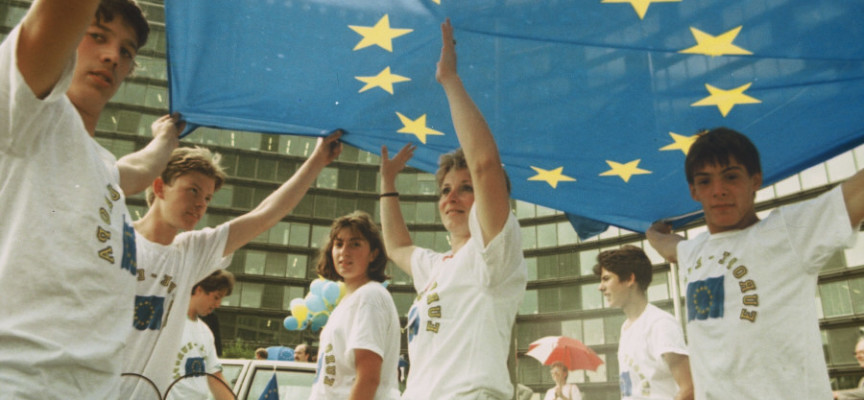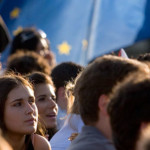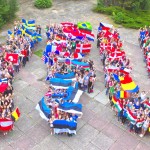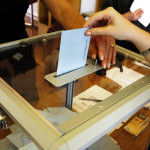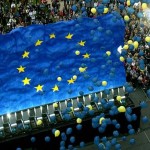The Y Generation, the NET Generation, the Millennials, those who were born in the 80s until the first years of the 2000, those who know the Cold War only from school books or from TV series, those who have forgotten or have never learned to use the Lira, the Franc, the Peseta and the Mark; those who think that customs are invented by the movies, those who have brothers and friends abroad, far from their home to study, to work or even live; those who experienced Interrail, Erasmus Program, a study exchange at 16, those who don’t have a passport yet, but have actually visited almost the entire cradle of the “old” Western society.
These are people who have Europe in their blood. These are the main characters of the “Report about young adults”, a research based on 9,000 young students made by the Italian Toniolo Institute about the mottled European topic. On May 5th, a conference was held in Milan, where the statistics of this report were presented, a research that focuses its attention on topics such as values, expectations, projects and choices of life, the perception of the Church, the trust in the institutions, the role of young adults in civil society and the relationships between generations. So in this hotchpotch the complicated recipe has three main ingredients: the young adults, Europe and the future, moreover in this important moment when the elections of the European Parliament are approaching, the first elections in which the Millennials are going to vote, the first ones after the financial crisis.
The number of NEET (young people who are neither studying nor searching for a job) in Italy is high, so the mistrust on the national and supranational institutions is not surprising. Not many people believe in the constitution of the “United States of Europe”, but at the same time, as Alessandro Rosina (associated lecturer at Università Cattolica del Sacro Cuore) underlined, statistical data show that “young adults don’t always look on the dark side of things. They know how to discern from people who are giving them useful instruments, such as school and university, and people who are not” (e.g. parties, some destructive politics, etc.). This is the fundamental data, that 95% of young adults, in Italy, are aware of being the richness of the State, and 2/3 of the interviewees know that they have to work pragmatically in order to realize themselves and society. There is actually disillusion but no resignation.
Culture, freedom and respect for people are the elements that make Europe different from other institutions according to under-34s. The young adults are waiting for the jump of quality of Europe and “it’s necessary to give young adults the possibility to believe in Europe”. At the top of the Y-Generation’s wish list there’s the request of a stronger effort for common social politics. “Young people would like to see a Europe full of opportunities”, said Moavero Milanesi, former Italian Minister for the European Affairs and judge of first grade at the European Justice Court, who gave a simple answer to the question: “Is Europe still our future?”. “I don’t know which future Italy alone could have, and the same goes for all the other States. We have to focus on Europe, get to know it, work to make it better, because the more we know about it, the more we will get in love with it”.
(Nathascia Severgnini)
La generazione Y, la Net Generation, i Millennials, i nati degli anni ’80 fino ai primi anni 2000, quelli che conosco la Guerra Fredda solo dai libri di scuola o dalle serie tv, che hanno dimenticato o addirittura mai imparato a usare la lira, il franco, la peseta, il marco; quelli per i quali le dogane sono misticismi dei film; quelli che hanno fratelli o amici lontani dal proprio Paese, via per studiare, lavorare o anche vivere; quelli dell’Interrail, dell’Erasmus, dello scambio a sedici anni, quelli che il passaporto non l’hanno ancora fatto a venti, ma che hanno girato gran parte della ‘vecchia’ culla dell’intera società occidentale. Sono quelli che l’Europa ce l’hanno nel sangue. Questi sono i protagonisti del “Rapporto Giovani”, ricerca su un campione di 9.000 ragazzi italiani condotta dall’Istituto Toniolo sulla machiavellica e screziata materia europea. Il 5 maggio, a Milano, si è tenuta una conferenza in cui sono stati presentati alcuni risultati di un’analisi che focalizza la sua attenzione su temi come i valori, le aspettative, i progetti e le scelte di vita, la percezione della Chiesa, la fiducia nelle istituzioni, il ruolo dei giovani nella società civile e il rapporto tra le generazioni. Nel calderone, quindi, la ricetta complicata ha tre ingredienti essenziali: i giovani, l’Europa e il futuro, per di più in un momento importante come questo, in cui si corre (anche se a volte si ha più l’impressione di arrancare) verso le elezioni del Parlamento Europeo , le prime in cui i Millennials voteranno, le prime post crisi finanziaria.
In Italia il numero di Neet (giovani che non studiano né cercano attivamente lavoro) è altissimo e la sfiducia nei confronti delle istituzioni nazionali e sovranazionali, quindi, non sorprende. In pochi credono nella costituzione degli ‘Stati Uniti d’Europa’; al tempo stesso, però, come ha sottolineato Alessandro Rosina, docente all’Università Cattolica del Sacro Cuore, dai dati emerge che “i giovani non vedono tutto nero! Sanno discernere tra chi sta dando loro strumenti utili, come la scuola e l’università, e chi non lo sta facendo” (i partiti, certe politiche distruttive, ndr). È questo il dato fondamentale, ossia che il 95% dei giovani, in Italia, si ritiene la ricchezza del Paese e 2/3 degli intervistati si rende conto di doversi impegnare pragmaticamente nella realizzazione di sé e della società. La disillusione c’è, la rassegnazione no.
Cultura, libertà e rispetto della persona sono i fattori che rendono l’Europa diversa dalle altre istituzioni secondo gli under 34. I ragazzi si aspettano il salto di qualità dell’Europa e “bisogna dare ai giovani la possibilità di credere nell’Europa”. Il primo posto della “lista dei desideri” della generazione Y è occupato dalla richiesta di puntare maggiormente su una politica sociale comune. “L’Europa che i giovani vorrebbero è l’Europa delle opportunità”, ha detto Enzo Moavero Milanesi, ex ministro per gli Affari europei e giudice di primo grado presso la Corte di Giustizia dell’Ue, che alla domanda “L’Europa è ancora il nostro futuro?” ha suggerito una risposta molto semplice: “Non vedo quale futuro possa avere da sola l’Italia, ma come noi anche tutti gli altri Stati. Dobbiamo focalizzarci sull’Europa che c’è, conoscerla, impegnarci a migliorarla. Più ne sappiamo, più ce ne innamoriamo”.
(Nathascia Severgnini)
Giovani Giornalisti
Latest posts by Giovani Giornalisti (see all)
- Erasmus? Then I’ll hire you - 31 ottobre 2014
- Young, yeast for Europe - 26 settembre 2014
- First elections for the “Millennials” - 12 maggio 2014

